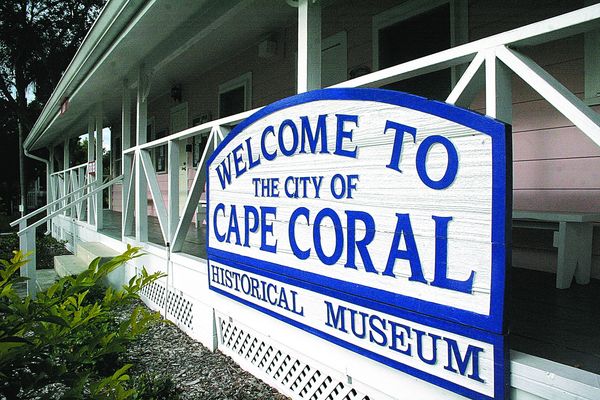Close vote in August 1970 created a new Florida city

A Dec. 10, 1970, Cape Coral Breeze picture of Lee County Commissioner Bruce Scott, far right, delivering the oath of office to Cape’s first council, from left, Lyman Moore, J. Chandler Burton, Paul Fickinger, C.F. “Casey” Jablonski, Gordon Berndt and Robert G. South. Councilmember Cleo Snead was absent from the photo.
- A Dec. 10, 1970, Cape Coral Breeze picture of Lee County Commissioner Bruce Scott, far right, delivering the oath of office to Cape’s first council, from left, Lyman Moore, J. Chandler Burton, Paul Fickinger, C.F. “Casey” Jablonski, Gordon Berndt and Robert G. South. Councilmember Cleo Snead was absent from the photo.
As the city celebrates 50 years of incorporation, Aug. 18, 1970, was a day like no other in the history of the city. The months leading up to the referendum vote were tense with two distinct viewpoints percolating among the residents. Many saw a city that needed to be separate from Lee County government in order to build an identity, have control over city services and manage growth. Others were happy with being under county jurisdiction and worried the tax burden might become too large as a fledgling city.
The vote on Aug. 18 reflected those split opinions as 2,067 residents voted for incorporation and 1,798 were against it. The vote was so close that some wondered whether the absentee ballots that had not yet been counted might swing the results in the other direction. They didn’t. The final vote: 2,249 for and 1,995 against.
The process of building to the referendum vote started in the Florida Legislature. On June 2, 1970, House Bill 5484 was introduced by Rep. M.T. “Ted” Randall and Rep. Lorenzo Walker, providing for the referendum vote on Cape Coral incorporation. The bill passed the House and then the Florida Senate on June 5. A week later, Gov. Claude R. Kirk Jr. signed the bill.
A firestorm of activity followed as residents on both sides of the referendum began lobbying for support. Chester M. “Chet” Grunsten was the chair of the “Committee on Incorporation.” L.B. Field and John Langan led a group called “Taxpayers Opposed to Incorporation.” Community forums drew hundreds of people as both sides presented strong cases.

“Our studies have indicated that only by incorporation can Cape Coral realize its full potential,” said Leo Fack, a member of the incorporation committee, in a Cape Coral Breeze article.
“This is the weakest, most inadequate and most undesirable form of government that can be saddled on this community,” countered L.B. Field, spokesperson for those opposed to incorporation.
In the end, the final vote totals reflected the hard-fought journey by both sides. Those against incorporation weren’t finished. They filed lawsuits and tried a petition drive for a recall referendum. Neither resulted in a change of the vote for incorporation.
Less than three months after the referendum, the first primary election led into the first general election for a city council. There were 3,959 votes cast from the 6,130 registered voters as seven new council members were elected into office. District 2 winner Paul Fickinger was elected by the new council as the first mayor. The other council members elected to two-year terms because they had the highest vote totals were J. Chandler Burton, Gordon Berndt and C.F. “Casey” Jablonski. Elected to one-year terms were Lyman Moore, Robert South and Cleo Snead.
The council’s first assignment was to select a city manager. On Jan. 4, 1970, Charles C. Ryan, a 60-year-old from Pompano Beach, was approved from an applicant list of 69. With a salary of $15,000, Ryan’s first day on the job was Jan. 15.
The first permanent ordinance passed by the council on Dec. 30, 1970, was a local tax on cigarette sales. The tax was expected to generate about $165,000 for a city that needed to take out an initial loan of $500,000 to get certain city services up and running. The second ordinance was to allow businesses to sell liquor. Obviously, the priorities then were a little different than those now.
Submitted by Tom Hayden, a Cape History Museum board member. As we celebrate 50 years as a city, much of our area’s history, chronicled at the museum, will be featured twice a month in similar articles provided to the Cape Coral Breeze.




